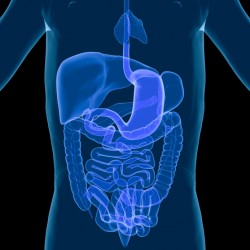
Breakdown of the gut lining is associated with inflammatory bowel disorders and colon cancer. Previously, Albert Reynolds, professor of cancer biology, and colleagues showed that the protein p120 helps maintain integrity of the gut lining in mice and its loss may play a role in inflammatory bowel disorders. However, these mice did not survive long enough to investigate the protein’s role in cancer formation.
Now, using a different mouse model that eliminates p120 expression in about 10 percent of the intestinal epithelium, the investigators have found that 45 percent of mice with focal (limited) p120 loss developed colon tumors within 18 months. However, none of the tumors showed complete loss of p120, suggesting that p120 loss promotes tumor formation indirectly.
The findings published recently in PLoS ONE suggest that p120 loss may set up an environment that allows an increased rate of mutation in tissues subjected to chronic inflammation, and that tumor formation may be driven by a lifelong inability to heal chronic wounds in such an environment.
The research was supported by grants from the National Cancer Institute.